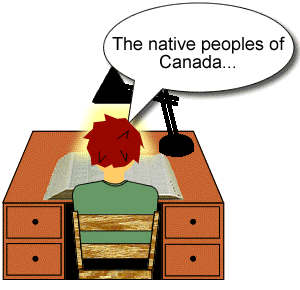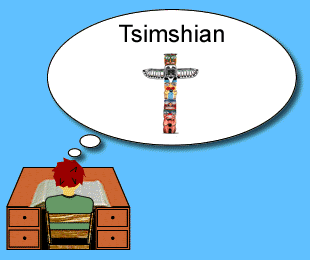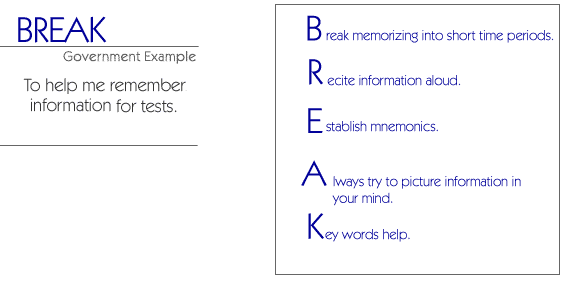B
reak memorizing into short
time periods.
"I have to read a chapter about
Canada for my geography class. Looking through the chapter, I
see that I have 10 pages to read. I will spend about 40 minutes
studying this chapter. I have decided to break the chapter into
two parts. I will read five pages at a time and take a short break
at the end of the first five pages."
|
 |
R
ecite information aloud.
"I'm going to take notes on the
native peoples that have lived in Canada. I will write the name
of each tribe on the front and what they were noted for on the
back. I will write the Tsimshian people on the front of the card.
On the back I will write that they used trees to build longhouses,
totem poles, and canoes to hunt whales and seals. I will write
the Algonquin on the front of the card. On the back I will write
that they were hunters so they did not have permanent homes. They
moved through the northern forests following moose and caribou.
For the Iroquois, I will write that they were farmers and built
villages along the Great Lakes and St. Lawrence River."
|

|
E stablish
mnemonics to help you remember information.
"To help me remember what each
tribe was noted for, I will create a sentence. For the Tsimshian,
I will use t, l (for longhouses), c (for canoes), and t (for totem
poles). I will use the sentence: Tarzan took long canoes. For
the Algonquin, I will use a, h (for hunters), and m (for moose).
I will use the word ham to remember. For the Iroquois, I will
use I, f (for farmers), and v (for villages) and g (for Great
Lakes). I will use the sentence: I feel very good."
|
 |
A
lways try to picture in your mind
words or pictures to help you remember.
"To help me remember how the
tribes lived, I will try to picture a totem pole for the Tsimshian,
a hunter shooting a bow and arrow at a buffalo for the Algonquin,
and a small Indian village for the Iroquois."
|

|
K
ey words help.
"To help me remember that the
Algonquin were hunters who did not have permanent settlements,
I will pick out the word gon (to stand for gone) to show that
they did not stay places, but were gone when the seasons changed."
|

|
|







